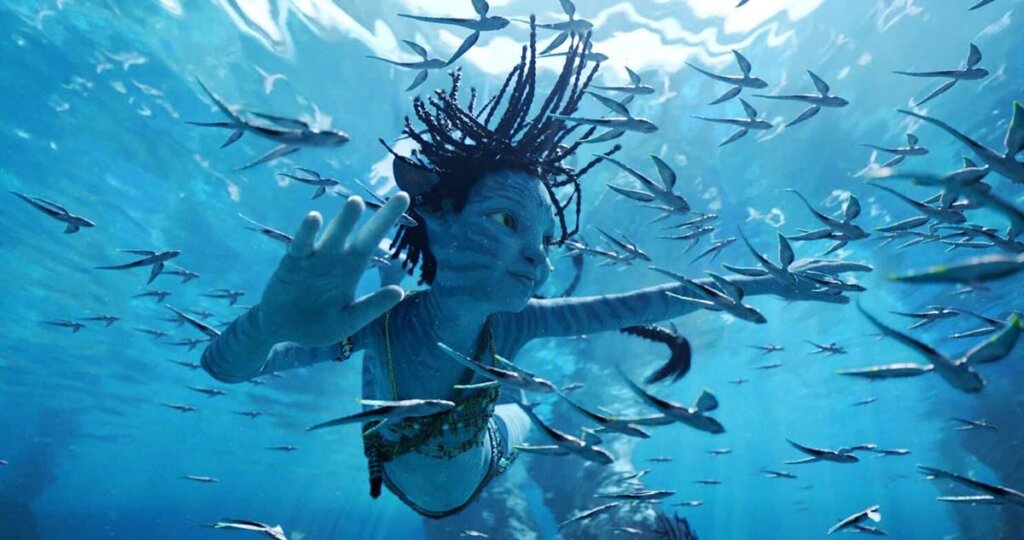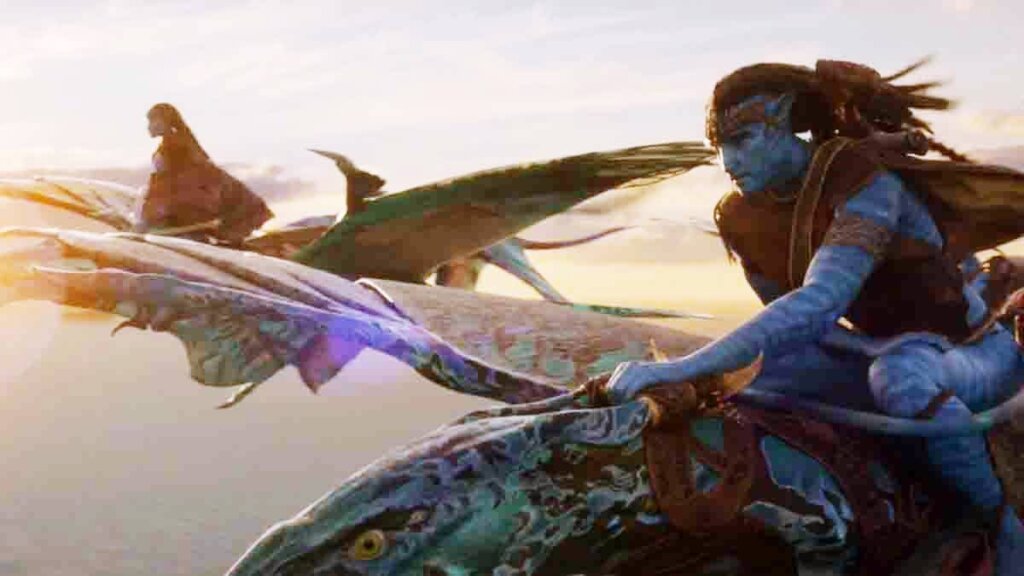Avatar: The Way of Water: A Beautiful Movie About Environmentalism


Written and verified by the psychologist Valeria Sabater
James Cameron is, without a doubt, the Leonardo Da Vinci of the movie world. In fact, few have brought technological innovation and narrative to the world of film in such a way.
Titles like Alien, Terminator, and Titanic are clear examples. Nor can we ignore the fact that no one has handled the fascinating universe of water in all its forms so well.
In 1989, Cameron gave us The Abyss, a film in which a team of divers collaborates with the Navy to find a sunken nuclear submarine. There, in the depths of the ocean, they make contact with an extraordinary race of aliens whose purpose is to save the human race from itself. It gave a message and idea that Cameron finished shaping the first Avatar, in 2009.
Indeed, one concept that’s always defined James Cameron’s movies is the importance of transmitting environmental awareness. Some label him as a sentimentalist, too preachy, and even idealistic. However, no one can deny his mastery of the difficult job of entertaining the public while, at the same time, conveying an important message.
“The Sky People have sent us a message… that they can take whatever they want. That no one can stop them. Well, we will send them a message…that they cannot take whatever they want! And that this… this is our land !”.
-Jake Sully-

Avatar: The Way of Water, Journey to Pandora’s water world
Avatar: The Way of Water is the first movie that James Cameron has directed in 13 years. During this period, productions with CGI (computer-generated images) have become a constant. Perhaps, for this reason, many people wondered if the great master of special effects would be capable, with this movie, of surprising the general public by producing more than a mere sequel.
He has. The movie marks a milestone in the evolution of visual effects technology in the aquatic environment. Its box office success has been undeniable and it’s already been shortlisted for the Best Visual Effects category at the 95th Academy Awards. However, beyond its fascinating staging, there’s been no shortage of critical voices and even some boycott campaigns.
Why? Let’s find out.
“Our great-mother does not take sides, Jake. She protects only the balance of life.”
-Neytiri-
The usual story, but more refreshing
Avatar: The Way of Water brings us back to its previous protagonist, the marine, Jake Sully. The body that he previously mentally manipulated is now his only physical vehicle.
He lives happily with his partner, Neytiri, raising their children, some of whom are adopted. He’s a Na’vi and one of the best insurgent warriors in the fight against the colonizers.
Unfortunately, harmony doesn’t last long in the idyllic world of Pandora as humanity’s colonial mission arises again, undermining peace.
In their desperate attempt to survive, Jake and his family must leave the woods to join another clan. They’re Na’vi of a lighter blue color, with fins and riding winged ichthyosaurs. They’re the people of the sea and teach Jake’s family the way of the water.
On that trip, they must also learn other rules and ways of connecting with nature. For example, they establish a symbiotic relationship with an extraordinary whale, called Tulkum.
If previously, the forests of Pandora seemed to be an unforgettable sensory experience, immersing ourselves in these sumptuous marine universes elevates us, as viewers, to another dimension. The water is another kind of Eden in which we’d all love to live.
Pandora and the colonizers serve as a mirror
In this sequel, as viewers, we’re even more captivated by Pandora than in the first movie. It has bioluminescent forests, six-legged predators, flowers, marine creatures, and beautiful reefs.
The show both makes our skin crawl and excites us. However, James Cameron also wants to evoke an obligatory awareness in the viewer.
This production is an homage to the natural world, to Mother Nature, who, in Pandora, they call Eywa. Humanity is the true enemy of itself and of all its ecosystems.
The Na’vi demonstrate how they always find a connection with the energy of their planet to restore balance and harmony. Dimensions that, as humans, we’ve broken and violated.
To date, we haven’t yet colonized a planet of blue aliens. However, the race to find new metals outside of Earth is already on. You only have to think of figures like Elon Musk, Jeff Bezos, or Donald Trump who, on numerous occasions, have spoken of the need to launch the kind of race in which we’d be new colonizers.
“The Na’vi say that every person is born twice. The second time is when you earn your place among the people, forever.”
-Jake Sully-
Environmentalism and film boycotts
We understand environmentalism as the set of practices that allows us to connect with a scenario or ecosystem without altering it, ensuring its balance and conservation at all times. It’s precisely what this movie suggests.
What’s more, James Cameron raises environmentalism to a kind of spirituality in which he sees a planet as a deity. A superior being that welcomes us and gives us life.
When seeing the Na’vi, it’s unavoidable to think of all those people who, due to colonialism and imperialism, were devastated. Their culture, way of life, and even their lands were plundered to erase everything sacred to them, everything that was genuine and in harmony with the land itself. America, Africa, Australia… Indeed, there are many Pandoras in our own world.
However, several voices have criticized this movie. James Cameron has been reproached for his unconscious arrogance and for telling the story, once again, of colonization from the perspective of the white man.

A show with firm values
Nobody denies that Avatar: The Way of Water is a spectacle of technology. That said, it bears no resemblance to the classic Marvel productions, in which sensationalism tends to dominate.
The Na’vi are avatars. They act as a mirror in which we see the reflection of our own humanity. Without a doubt, it’s something we shouldn’t lose sight of.
Beyond recovering a connection with nature and respect for the environment, this movie tells of love and family. It also speaks of leadership, the union of people, and even the strength of women.
Ronal, the pregnant tribal leader, and Neytiri are yet another example of Cameron-created characters who, like Lieutenant Ripley or Sarah Connor, are hard to forget.
This three-hour movie may prove to be too long for some. For others, it’ll be a trip that passes in a flash and leaves them wanting to return to Pandora again. Fortunately, the production of the third sequel is already underway.
James Cameron is, without a doubt, the Leonardo Da Vinci of the movie world. In fact, few have brought technological innovation and narrative to the world of film in such a way.
Titles like Alien, Terminator, and Titanic are clear examples. Nor can we ignore the fact that no one has handled the fascinating universe of water in all its forms so well.
In 1989, Cameron gave us The Abyss, a film in which a team of divers collaborates with the Navy to find a sunken nuclear submarine. There, in the depths of the ocean, they make contact with an extraordinary race of aliens whose purpose is to save the human race from itself. It gave a message and idea that Cameron finished shaping the first Avatar, in 2009.
Indeed, one concept that’s always defined James Cameron’s movies is the importance of transmitting environmental awareness. Some label him as a sentimentalist, too preachy, and even idealistic. However, no one can deny his mastery of the difficult job of entertaining the public while, at the same time, conveying an important message.
“The Sky People have sent us a message… that they can take whatever they want. That no one can stop them. Well, we will send them a message…that they cannot take whatever they want! And that this… this is our land !”.
-Jake Sully-

Avatar: The Way of Water, Journey to Pandora’s water world
Avatar: The Way of Water is the first movie that James Cameron has directed in 13 years. During this period, productions with CGI (computer-generated images) have become a constant. Perhaps, for this reason, many people wondered if the great master of special effects would be capable, with this movie, of surprising the general public by producing more than a mere sequel.
He has. The movie marks a milestone in the evolution of visual effects technology in the aquatic environment. Its box office success has been undeniable and it’s already been shortlisted for the Best Visual Effects category at the 95th Academy Awards. However, beyond its fascinating staging, there’s been no shortage of critical voices and even some boycott campaigns.
Why? Let’s find out.
“Our great-mother does not take sides, Jake. She protects only the balance of life.”
-Neytiri-
The usual story, but more refreshing
Avatar: The Way of Water brings us back to its previous protagonist, the marine, Jake Sully. The body that he previously mentally manipulated is now his only physical vehicle.
He lives happily with his partner, Neytiri, raising their children, some of whom are adopted. He’s a Na’vi and one of the best insurgent warriors in the fight against the colonizers.
Unfortunately, harmony doesn’t last long in the idyllic world of Pandora as humanity’s colonial mission arises again, undermining peace.
In their desperate attempt to survive, Jake and his family must leave the woods to join another clan. They’re Na’vi of a lighter blue color, with fins and riding winged ichthyosaurs. They’re the people of the sea and teach Jake’s family the way of the water.
On that trip, they must also learn other rules and ways of connecting with nature. For example, they establish a symbiotic relationship with an extraordinary whale, called Tulkum.
If previously, the forests of Pandora seemed to be an unforgettable sensory experience, immersing ourselves in these sumptuous marine universes elevates us, as viewers, to another dimension. The water is another kind of Eden in which we’d all love to live.
Pandora and the colonizers serve as a mirror
In this sequel, as viewers, we’re even more captivated by Pandora than in the first movie. It has bioluminescent forests, six-legged predators, flowers, marine creatures, and beautiful reefs.
The show both makes our skin crawl and excites us. However, James Cameron also wants to evoke an obligatory awareness in the viewer.
This production is an homage to the natural world, to Mother Nature, who, in Pandora, they call Eywa. Humanity is the true enemy of itself and of all its ecosystems.
The Na’vi demonstrate how they always find a connection with the energy of their planet to restore balance and harmony. Dimensions that, as humans, we’ve broken and violated.
To date, we haven’t yet colonized a planet of blue aliens. However, the race to find new metals outside of Earth is already on. You only have to think of figures like Elon Musk, Jeff Bezos, or Donald Trump who, on numerous occasions, have spoken of the need to launch the kind of race in which we’d be new colonizers.
“The Na’vi say that every person is born twice. The second time is when you earn your place among the people, forever.”
-Jake Sully-
Environmentalism and film boycotts
We understand environmentalism as the set of practices that allows us to connect with a scenario or ecosystem without altering it, ensuring its balance and conservation at all times. It’s precisely what this movie suggests.
What’s more, James Cameron raises environmentalism to a kind of spirituality in which he sees a planet as a deity. A superior being that welcomes us and gives us life.
When seeing the Na’vi, it’s unavoidable to think of all those people who, due to colonialism and imperialism, were devastated. Their culture, way of life, and even their lands were plundered to erase everything sacred to them, everything that was genuine and in harmony with the land itself. America, Africa, Australia… Indeed, there are many Pandoras in our own world.
However, several voices have criticized this movie. James Cameron has been reproached for his unconscious arrogance and for telling the story, once again, of colonization from the perspective of the white man.

A show with firm values
Nobody denies that Avatar: The Way of Water is a spectacle of technology. That said, it bears no resemblance to the classic Marvel productions, in which sensationalism tends to dominate.
The Na’vi are avatars. They act as a mirror in which we see the reflection of our own humanity. Without a doubt, it’s something we shouldn’t lose sight of.
Beyond recovering a connection with nature and respect for the environment, this movie tells of love and family. It also speaks of leadership, the union of people, and even the strength of women.
Ronal, the pregnant tribal leader, and Neytiri are yet another example of Cameron-created characters who, like Lieutenant Ripley or Sarah Connor, are hard to forget.
This three-hour movie may prove to be too long for some. For others, it’ll be a trip that passes in a flash and leaves them wanting to return to Pandora again. Fortunately, the production of the third sequel is already underway.
This text is provided for informational purposes only and does not replace consultation with a professional. If in doubt, consult your specialist.







